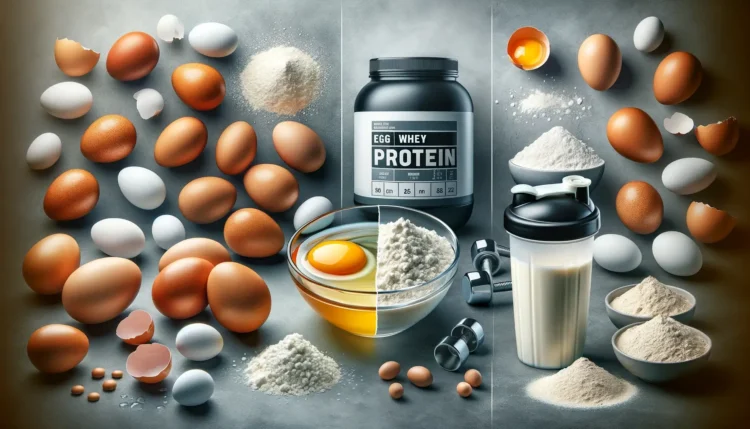Did you know that protein is essential for muscle growth and repair? When it comes to choosing a protein supplement for muscle gain, the debate between egg protein and whey protein is a hot topic.
Both are popular options among fitness enthusiasts and athletes, offering complete protein with essential amino acids. But which one is the best choice for maximizing muscle gain? Let’s dive into the details and compare the two protein sources to find out.
What is Egg Protein?
Egg protein is a type of protein found in eggs. It is known for its high-quality amino acid profile and digestibility. Egg protein powder, made from egg whites, is a concentrated source of protein. It is rich in the anabolic amino acid leucine, which promotes muscle growth and repair.
Egg protein is a complete protein, meaning it contains all the essential amino acids required by the body. Its bioavailability, or ability to be absorbed and utilized by the body, is also high.
Egg protein has several benefits, especially for individuals with specific dietary needs or preferences. It is a suitable option for those with milk allergies or lactose intolerance who are unable to consume dairy-based proteins like whey protein.
Egg protein can be used in various ways to add protein to your diet. It can be an ingredient in omelets, baked goods, and protein pancakes. Additionally, egg protein powder can be used as a substitute for liquid egg whites in recipes.
The Benefits of Egg Protein:
- Egg protein is a complete protein with all essential amino acids.
- It has a high bioavailability, meaning it is easily absorbed and utilized by the body.
- It is rich in leucine, which supports muscle growth and repair.
- Egg protein is lactose-free, making it suitable for individuals with lactose intolerance.
- It can be used as an ingredient in various recipes, providing a convenient way to increase protein intake.
What is Whey Protein?
Whey protein is a protein derived from milk. It is highly regarded for its excellent amino acid profile, making it an ideal choice for muscle building. This protein variant is widely available in powder form and is commonly used as a dietary supplement.
Whey protein is found in different forms such as whey protein concentrate and whey protein isolate. While both are effective, they differ in their nutritional composition.
Whey protein concentrate contains a higher amount of lactose and fats compared to whey protein isolate, which has reduced levels of lactose and fat. This is particularly beneficial for individuals who may have lactose intolerance or are seeking a leaner protein source.
Whey protein is rich in leucine, an essential amino acid that plays a pivotal role in muscle growth and repair. It has been extensively studied for its effects on muscle development, sports performance, and post-workout recovery.
To showcase the nutritional differences between whey protein concentrate and whey protein isolate, refer to the table below:
| Whey Protein Concentrate | Whey Protein Isolate | |
|---|---|---|
| Protein Content | Varies (typically 70-80% protein) | High (typically 90% protein or higher) |
| Lactose Content | Higher | Lower |
| Fat Content | Higher | Lower |
| Carbohydrate Content | Varies | Varies (often close to zero) |
| Price | Lower | Higher |
As seen in the table, whey protein isolate provides a higher protein content and lower levels of lactose, fat, and carbohydrates compared to whey protein concentrate. However, it is important to note that both forms of whey protein can be beneficial depending on individual dietary needs and goals.

When considering the comparison between whey protein and egg protein, whey protein stands out for its high amino acid profile, specifically leucine, and its proven effectiveness in promoting muscle growth and sports performance.
However, it’s essential to consult with a healthcare professional or nutritionist to determine which protein supplement aligns best with your specific needs and preferences.
Nutritional Comparison
When considering the nutritional composition of egg protein and whey protein, there are key differences that may influence your choice. Both types of protein powder contain similar calorie counts, ranging between 120 and 130 calories per scoop. However, the macronutrient breakdown differs.
Egg protein typically has lower levels of carbohydrates and fat compared to whey protein. This makes egg protein a favorable option for individuals following a low-carb or low-fat diet. On the other hand, the exact carbohydrate and fat content of whey protein may vary depending on the type.
| Nutrient | Egg Protein | Whey Protein |
|---|---|---|
| Calories (per scoop) | 120-130 | 120-130 |
| Carbohydrates (g) | 2-3 | Varies |
| Fat (g) | 0-1 | Varies |
Whey protein concentrate typically contains slightly higher levels of carbohydrates and fats compared to whey protein isolate. If you are specifically looking to limit your carb or fat intake, choosing a whey protein isolate may be a better option.
When it comes to micronutrients, there are differences to consider as well. Whey protein generally provides more calcium, which is essential for bone health, while egg protein is higher in potassium, which plays a vital role in muscle and nerve function.
It’s important to consider your individual dietary needs and goals when choosing between egg protein and whey protein. If you prioritize low-carb or low-fat options, egg protein may be the better choice. However, if you require higher calcium levels or have specific potassium needs, whey protein could be more suitable.
Allergies and Intolerances
When it comes to allergies and intolerances, it’s essential to choose a protein supplement that aligns with your dietary needs. Both egg protein and whey protein can be suitable options depending on individual sensitivities.
Egg protein is an excellent choice for individuals with milk protein allergies or lactose intolerance. Since it is derived from eggs, it does not contain lactose or milk proteins that can trigger allergic reactions. This makes egg protein a safe and viable alternative for those with dairy-related sensitivities.
Whey protein, on the other hand, is an ideal option for individuals with egg protein allergies, provided they don’t have lactose intolerance or milk protein allergies. Whey protein is derived from milk and does not contain any egg proteins. It offers a complete amino acid profile and is widely popular among fitness enthusiasts and athletes.
When selecting a protein supplement, it’s crucial to be aware of any existing allergies or intolerances. Consulting with a healthcare professional or nutritionist can provide valuable guidance in determining the best protein supplement for your specific needs.
Additionally, conducting an elimination diet can help identify and address any potential food allergies or intolerances that may impact your protein supplement selection.

Taste and Versatility
When it comes to protein supplements, taste and versatility are important factors to consider. In the battle of whey vs egg protein, taste plays a significant role in determining which protein powder is more enjoyable for consumption.
Let’s start with taste. Whey protein is known for its smooth and creamy texture, making it a crowd-pleaser for many fitness enthusiasts. Whether you’re blending it into a post-workout shake or mixing it with your favorite beverage, whey protein is often praised for its pleasant flavor.
It comes in a variety of enticing flavors like chocolate, vanilla, and strawberry, making it easy to find a taste that suits your palate.
On the other hand, egg protein powder has a distinct, slightly eggy taste. Some people enjoy this unique flavor, especially when using it in baked goods or savory dishes like omelets and pancakes. The sharpness of the taste can add an interesting twist to your culinary creations and provide a different experience than traditional whey protein.
Another aspect to consider is versatility. While both whey and egg protein powders can be used in a variety of recipes, whey protein offers more flexibility in terms of its usage. Its smooth texture and neutral flavor make it easy to incorporate into shakes, smoothies, yogurt bowls, and even baked goods.
Whey protein can also be found in different forms like concentrate, isolate, and hydrolysate, allowing you to choose the version that best suits your needs.
Egg protein powder, on the other hand, is particularly well-suited for baking and cooking. Its robust flavor and unique properties make it an excellent choice for adding protein to your favorite recipes, especially those that require a sturdy protein base.
From protein pancakes to protein-packed cookies, egg protein powder can enhance the nutritional profile of your homemade treats.
In summary, whey protein is favored for its appealing taste and versatility in various recipes and beverages. On the other hand, egg protein brings a distinct flavor and is a great choice for individuals looking to enhance the protein content of their cooked meals and baked goods.
Conclusion
When it comes to building muscle and meeting your fitness goals, both whey protein and egg protein can be valuable additions to your diet. Both of these protein sources offer complete protein with essential amino acids that are crucial for muscle repair and growth.
Whey protein, in particular, has been extensively studied for its positive effects on muscle growth, sports performance, and recovery. It is known for its excellent amino acid profile and high leucine content, which plays a vital role in muscle protein synthesis.
Additionally, whey protein comes in different forms, such as whey protein concentrate and whey protein isolate, allowing you to choose the option that best suits your nutritional needs.
Egg protein, on the other hand, provides an alternative for individuals with milk allergies or lactose intolerance. It offers a concentrated source of protein made from egg whites, which are rich in the anabolic amino acid leucine.
Egg protein powder can be used in various dishes, such as omelets and baked goods, making it a versatile option for incorporating protein into your daily meals.
Ultimately, the choice between whey protein and egg protein depends on your personal preferences, dietary restrictions, and individual goals. Consider factors such as taste, allergies, and your specific nutritional needs when making a decision.
It is always recommended to consult with a healthcare professional or a nutritionist to determine the best protein supplement for your muscle-building journey.
FAQ
Is egg protein or whey protein better for muscle gain?
Both egg protein and whey protein are suitable for muscle gain, as they provide complete protein and essential amino acids. The choice between the two depends on individual preferences, allergies, and dietary restrictions.
What are the benefits of egg protein?
Egg protein is known for its high-quality amino acid profile and digestibility. It can be beneficial for individuals with milk protein allergies or lactose intolerance. Egg protein can also be used in various recipes and as a substitute for liquid egg whites.
What is the difference between egg protein and whey protein?
Egg protein is derived from eggs and is rich in the anabolic amino acid leucine. Whey protein is derived from milk and has an excellent amino acid profile. Whey protein concentrate contains more lactose and fats, while whey protein isolate has reduced lactose and fat content.
How do egg protein and whey protein compare nutritionally?
Egg protein is lower in carbs and fat compared to whey protein, which can vary depending on the type. Whey protein generally provides more calcium, while egg protein has a higher potassium content.
Can individuals with allergies or intolerances consume egg protein or whey protein?
Egg protein is suitable for individuals with milk protein allergies or lactose intolerance. Whey protein is suitable for individuals with allergies to egg proteins, provided they don’t have lactose intolerance or milk protein allergies. It’s important to consider individual allergies and intolerances when selecting a protein supplement.
How do egg protein and whey protein taste?
Whey protein is generally perceived to have a more appealing taste and can be easily mixed into shakes and smoothies. Egg protein has a sharper taste and may be more suitable for baking, omelets, and pancakes.
Which protein is better for muscle building?
Both egg protein and whey protein have been studied for their effects on muscle growth and sports performance. Whey protein has more extensive research supporting its effectiveness, but more studies comparing the two proteins are needed.




